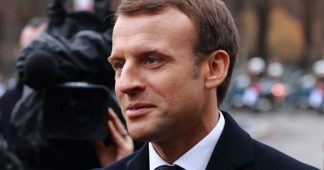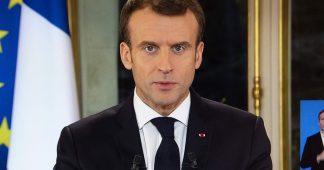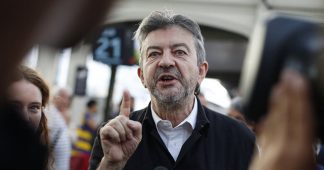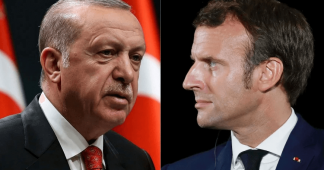Ahead of the French presidential election, Emmanuel Macron’s poll lead has shrunk to almost zero. After years of battering France with unpopular reforms, even the call to rally against the far right is producing diminishing returns.
By Francesco Massimo
Apr 6, 2022
Almost sensing the rift that was already developing, Le Monde began its front-page coverage the next day, with a pie chart showing Macron’s “real” votes weighed against low turnout and invalid votes: only 43 percent of the real electorate had backed this forty-year-old upstart. But now this former senior finance official, investment banker, economy minister, follower of philosopher Paul Ricoeur, and protégé of Socialist president François Hollande (before he stabbed him in the front) was president.
Class Project
It’s difficult to draw a balance sheet of what “Macronism” has been over the past five years. Is there really a solid ideological-political framework behind this term? As if to represent its political indescribability, in France people prefer to speak of a land called “Macronie,” a toponym that evokes a fantastical place, an elusive constellation. Macronie is above all an archipelago of relationships: the ones built over time by the young Macron, whose biography embodies both the “center” and the ever shifting positions of France’s elites.
His beginnings in politics, at the end of the 1990s, are to be found in the orbit of the neosovereigntist wing of French socialism identified with Jean-Pierre Chevènement (spotted at Macron’s rally last Sunday). But already in 2006, recently graduated from the prestigious École Nationale d’Administration — breeding ground of the nation’s ruling classes — Macron had settled in the Socialist Party. He was co-opted into the influential Club of the Gracchi, an informal group of industrialists and senior officials pushing for a definitive neoliberal turn within the party.
Between 2008 and 2012, Macron also began a brilliant career in finance and banking with Rothschild and Co. After amassing a million-euro fortune and building new relationships, Macron returned to politics just as the Socialists came to power. And this is where Macronie as a neoliberal political-economic program began to take shape. As economy minister, during the second part of Hollande’s presidency (2014–17), Macron stood out for his orthodox “reformist” agenda: deregulation of the labor market, extension of Sunday work, deregulation of public transport by road at the expense of rail. His zeal repeatedly meant difficulty for his supposed political father, President Hollande, who did not remotely imagine that the young Macron was already working for the presidential race. “I didn’t see him coming,” Hollande later said.
Between 2014 and 2017, Hollande’s standing was quickly eroded: the betrayal of electoral promises (“My enemy is finance!” he declared in 2012), tax breaks for business, labor-market reform that facilitated layoffs, and adherence to an avowedly supply-side economic policy stirred a mass protest movement that was harshly repressed. Support for the Socialist Party fell away rapidly. In 2017, Hollande decided against even running again: the road to the presidency was open for Macron.
Macronie is a territory crisscrossed by bankers, entrepreneurs, publishers, and politicians of the Right, Left, and center. By the time Macron showed up, the Socialists were exhausted by their spell in power, and the Gaullist right seemed to have grown tired of depriving them of it. Macron could bring back the latter but without scaring off the former. Macronie brought together first of all a liberal-conservative Orleanism, one of the three traditions of the French right (along with reactionary legitimism and authoritarian Bonapartism), the Catholic liberal center-right once associated with 1970s president Valéry Giscard d’Estaing, and then, subsequently, the veterans of Gaullism and the shipwrecked Socialist Party.
To sell this operation to the electorate, Macronie transformed itself into an electoral archipelago. It repurposed some of the emancipatory watchwords of the republican left (“égalité” became “equality of opportunity,” while meritocracy took the place of equity, and the destruction of welfare was passed off as individual autonomy), emptying them of meaning and mixing them into a superficial foam that floats on a fundamentally ultraliberal and elitist social, political, and economic program. “You only need to cross the street to find a job,” Macron told an unemployed man; “A train station is a place where you meet people who are nothing,” he stated during the inauguration of an “incubator” for start-ups; he joked during an official visit to Brittany that “kwassa-kwassa” fishing boats brought not fish but Africans.
But beyond his words and program, Macron’s design rests on a class alliance. As the economists Bruno Amable and Stefano Palombarini note, Macron’s victory relied on a “bourgeois bloc,” an alliance that excludes “programmatically the whole of the popular classes from its perimeter [and in which] the middle and upper classes previously separated by the division between Right and Left found themselves united in support of the European project and neoliberal reforms.”
Once the election was won, Macronie became the presidential palace itself, from which Macron wasted no time. In continuity with Hollande, the first assault was against the world of labor. The ordonnances, or decree laws, of September 2017 reduced worker representation in companies, weakened the role of trade unions, and set a ceiling on severance pay. The social and trade union movement that had mobilized in 2016 was still exhausted, and the measures passed without strong resistance in the streets. The tax on large fortunes was abolished. The offensive continued in spring 2018 with a round of “reforms” targeting workers for national rail network SNCF, one of the most organized and combative sectors of French labor.
Class Opulence and Social Collapse
However, it was in fall 2018 that the turning point unexpectedly came. Ignited by the indiscriminate increase in fuel taxes, spontaneous protests of “ordinary” citizens, motorists, and workers from the suburbs and rural areas started popping up, setting the country ablaze. Roundabouts and the logistical hubs of cities and suburbs were occupied by the gilets jaunes: an unexpected sledgehammer of a mobilization, alien to the traditional languages of street protest, excluded from representation by what the French call “intermediate bodies” like parties and unions. This first postdemocratic revolt seriously challenged the police organizationally, the government politically, and the ruling classes socially. On December 1, Macron and ministers were forced to quickly evacuate the Élysée Palace because the crowd threatened to storm the building. The symbols of class opulence, in the West of Paris, were violated: the Arc de Triomphe and the Trocadéro occupied, the luxury restaurant Fouquet’s looted and set on fire. Every Saturday the demonstrations, disorganized and unpredictable, followed one another in Paris and in the rest of France. The disoriented government withdrew the contested economic measures, but by now the plebeian masses were talking about direct democracy, removal of the sovereign, overthrow of the social order. The answer, then, was one that had been well tested already: repression. The police shot at point-blank range with flash-balls, sting-ball grenades, and tear gas. In the following months, to cope with unauthorized demonstrations, the motorized police units were reinstated: the BRAV, heirs of the voltigeurs, a unit created in 1968 and disbanded in 1986 after officers murdered twenty-two-year-old student Malik Oussekine as he was leaving a jazz club, a short distance from and a few hours after the eviction of the occupied Sorbonne.
Put on the defensive by the gilets jaunes, the government had to slow down its reactionary-restorationist onslaught. Nevertheless, in December 2019, a new project was ready: the pension reform, which included the end of special social security schemes (for civil servants, rail and tramway workers, among others) and the extension of the retirement age. A general mobilization was prepared, threatening to bring the country to a standstill between December 2019 and January 2020. It was the return of the unions, refreshed but, in some ways, also displaced by the gilets jaunes.
Demonstrations followed one another, with the usual script of clashes and injuries. Many dozens of protesters have been seriously injured and maimed by the police during Macron’s term; according to journalist David Dufresne and the Desarmons-les (Let’s Disarm Them) collective, 2,500 protesters were injured in 2019 alone, by the government’s own admission.
As the social clash flared up again, however, history turned anew, and the arrival of the pandemic completely derailed the government’s plans. Faced with a global, mass event, a health emergency, and an unprecedented economic lockdown, the neoliberal agenda proved completely anachronistic and useless. The illusion was shattered for good and left room for improvisation. The pension reform was put on hold, and Macron began to assert the need for state intervention to support the health and economic effort in the face of the pandemic. In his first speech announcing a mass lockdown, in mid-March 2020, Macron ominously uttered the words “We are at war.”
Macronie now reorganized, but without a plan or clear way forward. The reform agenda suffered a setback that not even the end of the pandemic was able to revive. The easy neoliberal solutions, according to which more precarity would lead to more employment, less taxes to more investments, more market to more efficiency, more liberalism to more equality, seem more than ever to be a tatty patch-up job. In the brief phases of respite from the pandemic, Macron, and especially his interior minister, Gérald Darminin, tried to cultivate the right-wing electorate with xenophobic remarks. (Darmanin accused Le Pen of being “soft on Islam.”) Universities minister Frédérique Vidal and education minister Jean-Michel Blanquer have stoked sterile but harmfully Islamophobic polemics about women wearing the veil and an alleged “Islamo-leftist” conspiracy among teaching staff. Recently, Macron has timidly returned to the need for pension reform, albeit postponing it until his second term in office.
Macronie Between Europe and Africa
In foreign policy, Macronie has been marked by the president’s feeling that he wants to be a protagonist but also by a series of “lost wagers.” The topic of global warming, picked up as a banner by Macron, especially at a time of friction with Trumpism and triumphant Bolsonarism, was dropped after the dismal compromises of the Rome and Glasgow summits.
Within the European Union, Macron set out to revive integration, dreading forms of enhanced cooperation, a hypothesis always welcomed in Italy, and finally settling more prosaically for a Franco-German leadership. Even the initiative of a European army remained a dead letter. In September 2021, a few days before the German elections, the British conservative newspaper the Telegraph spread the news, formally denied by the Elysée Palace, that France was willing to share its seat in the UN Security Council in exchange for the EU committing to build a European army. But the proposal was sharply attacked by the French right (Le Pen accused Macron of “treason”) and has remained a dead letter also due to German disinterest.
Recent developments in the war in Ukraine have also frustrated the project of an essentially French-led and German-expensed military force, as Germany (as well as Italy and the Netherlands) has decided to purchase US F-35s. “In France,” Deutsche Welle cites one researcher, “the decision has been met with frustration. . . . The F-35 is understood here as a symbol of US power within NATO. After all the speeches about European autonomy and sovereignty, one had expected Germany to be more aligned with a European arms policy.”
An even more serious setback, or rather a “stab in the back” as Paris termed it, was the military agreement between the United States, the UK, and Australia in September 2021, which led to the cancellation of a fifty-year contract worth €56 billion for the production of twelve conventional (nonnuclear) submarines between Canberra and the French conglomerate Naval Group. Further, in September 2021, some controversial statements by Macron, pronounced during a ceremony with eighteen young Frenchmen of Algerian origin, triggered a diplomatic crisis with Algeria, which withdrew its ambassador and revoked authorization for the transit through its airspace of French military aircraft participating in the military Operation Barkhane in Sahel.
The Sahel has indeed been a most decisive region for Macronie. The new military junta in Mali has led to a deterioration of relations between the two countries, in a spiral of tensions that led to the end of Operation Barkhane and the withdrawal of French forces in February, just as Russia, through the private military contractor Wagner Group, was sending paramilitaries to Mali. It is safe to assume that Macron’s numerous talks, in person and by phone, with Vladimir Putin during the crisis prior to the invasion of Ukraine included not only discussions about Eastern Europe but also about West Africa. In any case, Macron’s prominence at this point, in part explained de jure by the fact that France holds rotating presidency of the EU and de facto by the uncertainties of German leadership during the government transition, proved ineffective.
If we add to the foreign policy chessboard the domestic social crisis and the fragility of the French economy — registering a historic trade deficit owing largely to the energy bill but also to the decline in industrial exports — Macronie is proving to be a fragile project. To try to stay in the saddle, the president is left once again playing the Le Pen card. There is a good chance that this time, too, the threat from Le Pen will lead the electorate to renew confidence in Macron. But this easy way out risks turning out to be an impasse if the candidate of left-wing rupture, Mélenchon — the ex-Trotskyist mounting a slow “tortoise”-like poll rise with his program of ecological and social planning — manages to beat Le Pen to the runoff. And even if Macron manages to remain on the throne, he will face challenges that neither ideological illusion nor improvisation will be able to meet.
Published at jacobinmag.com
We remind our readers that publication of articles on our site does not mean that we agree with what is written. Our policy is to publish anything which we consider of interest, so as to assist our readers in forming their opinions. Sometimes we even publish articles with which we totally disagree, since we believe it is important for our readers to be informed on as wide a spectrum of views as possible.











